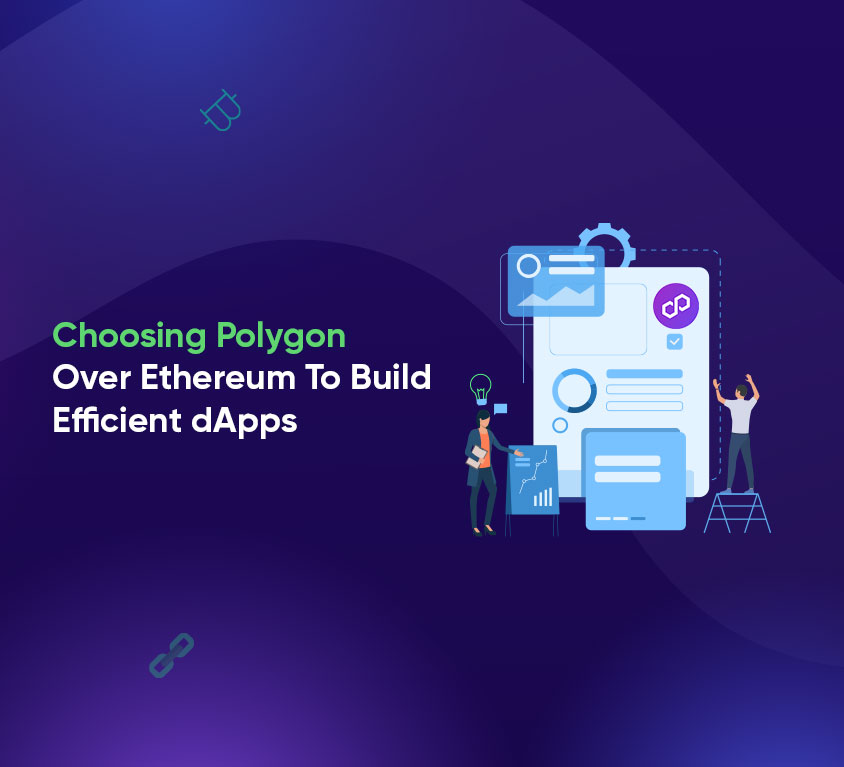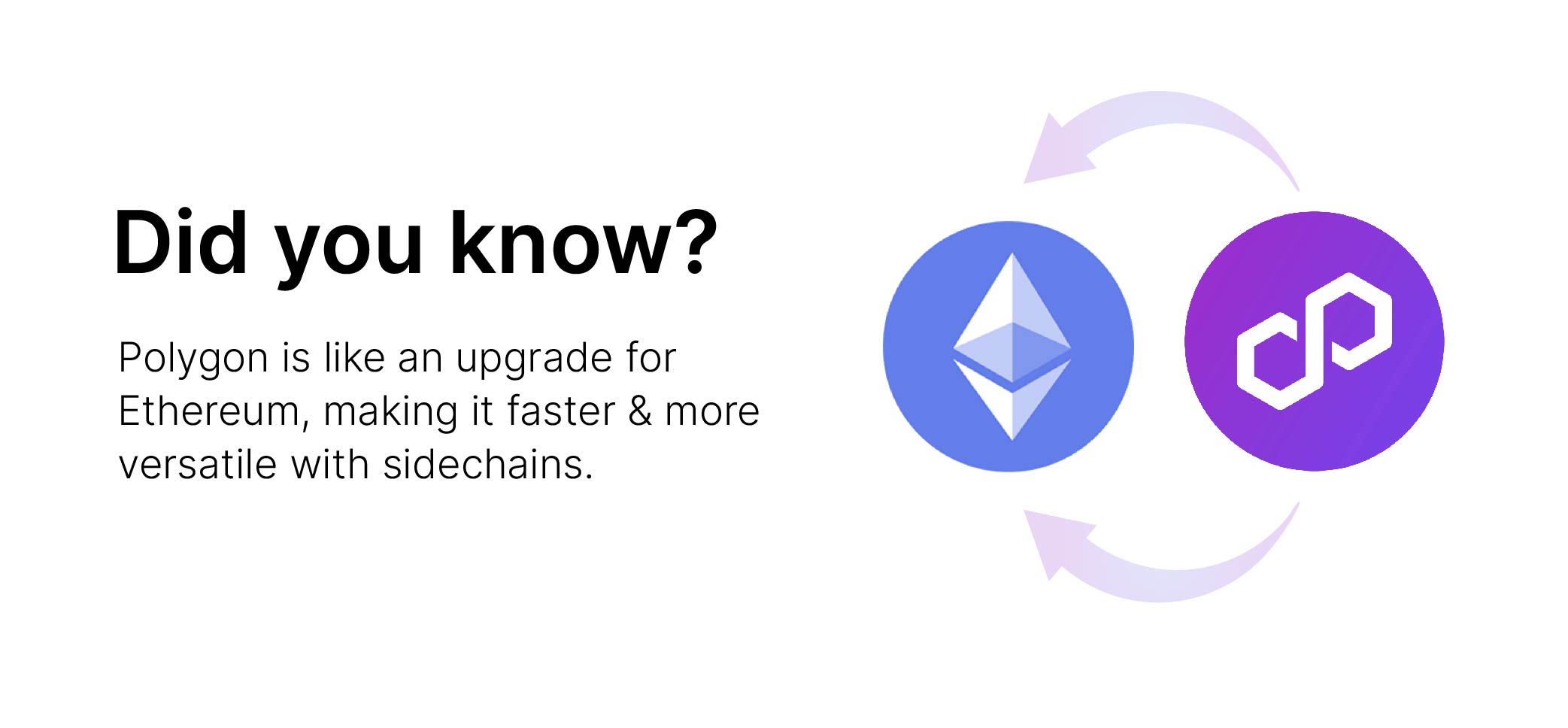
Introduction
Blockchain & Web3 Services Trusted By Leaders
- Develop innovative solutions using our state-of-the-art blockchain expertise.
- Achieve accelerated growth with robust & scalable Web3 consulting.
- Unlock 360-degree security with our top-rated blockchain development.
Polygon vs. Ethereum: Choosing Polygon Over Ethereum To Build Efficient dApps
Ethereum is often known as the initiative of smart contract platforms. In addition, this has seen exponential growth in adoption since 2020. However, this surge in usage has exposed some inherent scalability drawbacks. In this blog, we are going to explore Polygon vs. Ethereum, its scaling issues, and its benefits. We will also go through the reasoning that will justify why the Polygon ecosystem is an effective solution to build efficient dApps and address these concerns. But, before that you should be aware of the rise of dApps and its use cases.What is a Polygon (MATIC)?
Polygon, previously named MATIC is a Layer 2 scaling solution created to increase the capabilities of Ethereum. Additionally, it offers a framework for building Ethereum-compatible blockchain networks often referred to as ‘sidechains’ or ‘child chains’. These sidechains work independently while remaining securely connected to the Ethereum mainnet. Polygon’s primary goal is to provide scalability with a user-friendly environment for decentralized applications (dApps) and services.
These sidechains work independently while remaining securely connected to the Ethereum mainnet. Polygon’s primary goal is to provide scalability with a user-friendly environment for decentralized applications (dApps) and services.
Who is behind Polygon?
The Polygon project was founded by a talented team of blockchain enthusiasts with a vision to improve the Ethereum ecosystem’s scalability. While Polygon ecosystem boasts a vibrant and diverse community of contributors. Moreso, Polygon’s core team includes three prominent individuals who have played instrumental roles in shaping its development and success.How does a Polygon Work?
Polygon operates as a Layer 2 scaling blockchain solution enhancing the features of the Ethereum network. This is achieved by establishing a network of sidechains, often referred to as “child chains.” Moreover, these sidechains are fully Ethereum-compatible, which means they support the same smart contracts and assets as the Ethereum mainnet.What is Ethereum (ETH)?
A decentralized as well as an open-source blockchain platform that introduced the idea of smart contracts. Ethereum played a vital role in revolutionizing the blockchain industry by enabling developers to create decentralized applications (dApps) with self-executing code called smart contracts. In addition, Ethereum’s native cryptocurrency, Ether (ETH), is used to power these applications and execute smart contracts.Ethereum Vs Polygon: Comparing Technical Operations
Polygon |
Ethereum |
|
|
Polygon vs. Ethereum: Final Comparative Analysis
- Scalability: Polygon’s Layer 2 solutions address Ethereum’s scalability limitations by offering a more scalable environment for dApps to operate efficiently. Ethereum, while groundbreaking, faces congestion issues during peak usage.
- Transaction Speed: Polygon outpaces Ethereum in terms of transaction speed, due to its sidechain architecture. Ethereum’s PoW consensus can result in slower confirmation times, particularly during network congestion.
- Cost and Fees: Polygon’s cost-effective transactions make it an attractive choice for users seeking affordable interactions with dApps. Ethereum’s gas fees, on the other hand, can be considerably higher during peak periods, impacting user affordability.
Polygon Vs Ethereum: Use Cases and Adoption
Real-world Applications on Polygon:
Polygon has gained traction as a go-to platform for various real-world applications and projects. Some notable examples include:- DeFi Protocols: Platforms like Aavegotchi and QuickSwap leverage Polygon’s high-speed, low-cost environment to provide decentralized finance solutions, including yield farming and decentralized exchanges.
- Gaming: The gaming industry has embraced Polygon, with games like Decentraland and Skyweaver utilizing its scalability to create immersive and interactive experiences.
- NFT Marketplaces: Polygon has witnessed a surge in NFT marketplaces like OpenSea, Rarible, and Mintable, offering artists and collectors an efficient platform for trading digital assets.
Real-world Applications on Ethereum
Ethereum has a rich history of powering various real-world applications, including:- DeFi Pioneers: Ethereum pioneered the DeFi movement, with platforms like Compound and MakerDAO shaping the decentralized finance landscape.
- Smart Contracts: Ethereum remains the go-to platform for deploying smart contracts across industries, including supply chain management, legal agreements, and more.
- Initial Coin Offerings (ICOs): Ethereum’s blockchain played a pivotal role in the ICO boom, enabling startups to raise funds through token sales.
Why Choose Polygon Over Ethereum?
Choosing Polygon for dApp development offers several key advantages:- Faster Transactions: Polygon’s Layer 2 scaling solutions provide quicker transaction confirmation times, ensuring a more efficient user experience.
- Lower Fees: With Polygon, users benefit from significantly reduced transaction fees, making microtransactions and everyday use of dApps more affordable.
- Scalability: Polygon’s sidechains alleviate Ethereum’s scalability challenges, enabling dApps to scale seamlessly as user adoption grows.
- Ecosystem Support: Polygon has garnered strong developer support and boasts a thriving ecosystem of dApps and projects.
Polygon DApps: A World of Possibilities
Polygon has opened up a world full of possibilities for developers and users alike due to its efficient and scalable infrastructure. Moreover, DApps (decentralized applications) built on Polygon enjoy several advantages, including lightning-fast transaction speeds, low gas fees, and a seamless user experience. Let’s deep dive into detail why polygon decentralized apps are better than Ethereum; Here are some of the exciting possibilities that Polygon DApps bring to the table:- Lightning-Fast Transactions: Polygon’s low-latency network and high throughput allow DApps to process transactions at lightning speed. Users experience near-instant confirmation times, enhancing the overall usability of DApps in the polygon ecosystem.
- Cost-Effective Transactions: Polygon’s low gas fees make it affordable for users to interact with DApps resulting in cost-effectiveness which encourages more users to engage with your DApp, driving adoption and usage.
- Scalable Infrastructure: Polygon’s scalability ensures that your DApp can handle a growing user base and increasing transaction volumes without sacrificing performance or efficiency.
- Interoperability: Polygon’s interoperability with Ethereum provides a seamless bridge between these two networks. As a result, your DApp can tap into vast Ethereum’s ecosystem of assets, services, and users.
- Diverse Use Cases: Whether you’re building a DeFi (Decentralized Finance) application, a gaming platform, an NFT marketplace, or any other type of DApp, Polygon provides the infrastructure to support diverse use cases.
- User-Centric Experience: Users of Polygon DApps enjoy a smooth and hassle-free experience. As, they don’t have to worry about exorbitant fees or slow transaction times, making your DApp more appealing.
- Developer-Friendly Environment: The Polygon ecosystem offers a developer-friendly ecosystem with comprehensive documentation, tools, and resources making it easier for developers to transition from Ethereum to Polygon.
- Polygon Smart Contracts: Polygon combines scalability and cost-efficiency with a powerful smart contract environment that unlocks new dimensions for automation, secure transactions, and decentralized apps.
Create Efficient dApps with Polygon
- Choose Polygon as Your Blockchain: Select Polygon as the foundation for your decentralized application (DApp).
- Utilize Development Tools like SDKs and APIs: Develop Polygon smart contracts for your dApp using compatible tools and programming languages.
- Thoroughly Test Your DApp: Conduct comprehensive testing of your DApp on Polygon’s testnet to identify and resolve any potential issues.
- Deploy on Polygon’s Mainnet: Once your DApp is ready and tested, deploy it on Polygon’s mainnet for real-world usage.
- Leverage Fast Transactions and Low Fees: Benefit from Polygon’s swift transaction processing and cost-effective fees, enhancing the user experience.
- Engage with the Polygon Developer Community: Join the Polygon developer community to seek guidance, exchange insights, and stay informed about the latest advancements in blockchain technology.